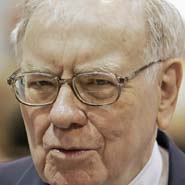 As noted here last month, Berkshire Hathaway chairman and mainstream media folk hero Warren Buffett is a key player and, as these NY Times and W$J articles report, perhaps even a key witness in the upcoming criminal trial of a former AIG executive and four former executives of Berkshire’s General Reinsurance Corp, including former General Re CEO, Ronald E. Ferguson.
As noted here last month, Berkshire Hathaway chairman and mainstream media folk hero Warren Buffett is a key player and, as these NY Times and W$J articles report, perhaps even a key witness in the upcoming criminal trial of a former AIG executive and four former executives of Berkshire’s General Reinsurance Corp, including former General Re CEO, Ronald E. Ferguson.
Although Buffett knew about the finite risk transactions that are at the heart of the prosecution, he is exempt from prosecution under the Buffett Rule. Previous posts on this case are here, here, here, here and here.
What’s particularly interesting about all this is that the prosecution is attempting to prevent the defense from even mentioning Buffett, whose knowledge of the transactions (and the government’s election not even to include Buffett as an unindicted co-conspirator, much less a defendant) is at least some evidence of the defendants’ lack of criminal intent (Warren Buffett would not engage in any criminal conduct, now would he?). The prosecution is contending that any evidence relating to Buffett’s knowledge of the transactions is hearsay and, thus, inadmissible. But until the testimony regarding Buffett’s knowledge is propounded in court, who knows whether it is hearsay?
Of course, the prosecution is not shy about using hearsay testimony when it comes from someone who is not an avuncular media darling such as Buffett. The prosecution has fingered former AIG chairman Maurice “Hank” Greenberg as an unindicted co-conspirator in the trial, which — based on previous experience — means that the prosecution will use testimony about Greenberg’s statements that would otherwise be hearsay.
As usual, Larry Ribstein sums up the vagaries of the government’s policy of selectively criminalizing merely questionable business transactions:
One might think that the government would have been trying to ensnare Buffett, who would be a high-profile trophy. The problem is that trying a cultural icon like Buffett would raise public doubt about the legitimacy of the government’s corporate crime enterprise. So Buffett gets the benefit of a version of the Apple rule — . . . the Buffett rule. In this case, unlike Enron, it’s better for the government to land the tuna than the barracuda.
According to the WSJ, the prosecution is arguing that “[t]he defendants want to deflect the issue of their involvement, knowledge and the intent relating to … the fraudulent transaction at the heart of this case by creating a trial-within-a-trial about Warren Buffett.” Deflect? Yes, I guess, for the government, a defendant’s insistence on defending himself is a pesky nuisance.
The bottom line is that issues of defendants’ guilt, including critical evidence of whether they knew they were engaging in wrongdoing, may not be available because, ultimately, the government decides who testifies by deciding whom to prosecute. All part of the costs of the extensive criminalization of accounting and other conduct of corporate agents.
